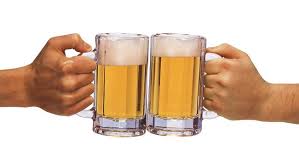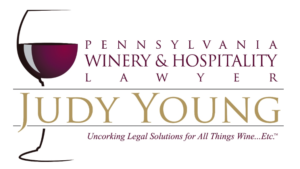Here’s What’s New With Pennsylvania’s New Liquor Laws
/0 Comments/in alcohol legislation, Pennsylvania Liquor Control Board /by Judy YoungALCOHOL LAW CHANGES COME TO PENNSYLVANIA
/0 Comments/in alcohol legislation, Pennsylvania Liquor Code /by Judy YoungEffective August 8, 2016, Act. 39 amendments to the Pennsylvania Liquor Code signed into law by Governor Wolk become effective. The Act is aimed at increasing the availability and promotion of Pennsylvania alcohol products. The Pennslyvania Liquor Control Board has issued a SUMMARY of information relevant to Licensees. The act is aimed at creating parity between its categories of manufacturers.
Of particular interest, the Pennsylvania Liquor Control Board has created a new direct wine shipper license (DWS) wherein a wine manufacturer may ship up to 36 cases of wine to Pennsylvania residents within a calendar year for personal use regardless whether produced in Pennsylvania, another state, or country. All wine however must be transported via a Pennsylvania licensed transporter-for-hire.
The big news of course it that those entities holding a restaurant or hotel license, the new law allows for the sale of wine up to three liters per single transaction, a matter of interest to the growing number of grocery stores.
Act 39 expands the availability of special exposition permits for Pennsylvania ciders, breweries, and distilleries which where historically only available to Pennsylvania Limited Wineries.
For more on this new change in law click here: Summary of Changes In Alcohol Law in PA.
Pennsylvania Regulators Make Way For Beer Home Delivery
/1 Comment/in alcohol legislation /by Judy YoungWhile most beer buyers have to purchase beer by the case or keg from a distributor, new changes are underway with the Pennsylvania Liquor Control Board that make way for less restrictive rules around the  selling of beer in Pennsylvania.
selling of beer in Pennsylvania.
The PLCB’s recent changes underway allow for the selling of a 12-pack of beer or less with food orders from businesses that have a “Transporter-for Hire” License. The purchase of beer must be processed in advance in the store prior to delivery. In other words, the beer has to be paid for over the phone with a credit card. Proper ID must be provided in an effort to avoid selling to minors.
This new change comes as good news to many restaurants and businesses hoping to boost their profit margins. For more, see below:
PLCB Regulatory Changes Comes To Pennsylvania Limited Wineries
/0 Comments/in alcohol legislation, Pennsylvania Liquor Code /by Judy YoungEffective March 1, 2014, the Pennslyvania Liquor Control Board announced regulatory changes that affect Limited Winery Licensees around the state. The PLCB has eliminated the requirement that prohibited in state wineries from selling bottles for less than the same wine sells for at the state operated Wine and Spirit Stores. The recent change is designed to promote in-state wineries. For more read: PLCB Changes Allow Wineries To Sell Products Below The State Sell Price.
Government Shutdown Stands To Create Economic Losses for Pennsylvania Wineries
/0 Comments/in alcohol legislation, Wine News of Interest /by Judy YoungFor those of us in the wine industry, the government shutdown has brought the wine approval business to a halt. Federal approval for new wineries and/or wine labels is handled by the Federal Tobacco Tax and Trade Bureau (TTB). For purposes of the government shutdown, the TTB has been deemed non-essential. The Federal Tobacco Tax and Trade Bureau is not processing COLAs, new wine application permits, label approvals, or importation of wine in bond. Approximately 800,000 of the two million U.S. federal employees have been furloughed.
The suspension of the TTB’s regulatory functions means all reviews of alcohol beverage label permits, formulas are suspended until such time funding is reinstated. This means that many Pennsylvania wineries will not be able to sell their wines until the shutdown ends and their applications can be processed. The legal documents required to bottle and sell the wine has come to a halt, hence having severe financial impact to many of the State’s wineries.
The TTB has posted an Appropriations Lapse Notice. Once government services resume, a horrendous backlog for application processing is anticipated as we are now approaching Day 14 of the shutdown.
Pennsylvania Wine Shipment Legislation Gains Momentum
/0 Comments/in alcohol legislation, Pennsylvania Wine Law /by Judy YoungOn March 28, the Pennsylvania State Senate unanimously passed 48-0, Senate Bill 790 which would allow consumers to have domestic wines from U.S. wineries shipped directly to their homes in the state. Under the legislation, consumers would be allowed to purchase by phone, mail or internet as many as 24 domestic wines per month. However, for those residents interested in purchasing imported wines, Pennsylvania residents would still be required to continue to obtain imported wine purchases from the 620 state owned/controlled liquor stores.
Under the bill, consumers would be required to verify their age and sign for shipments. Wineries would be required to collect taxes prior to shipping and to pay a $100 state registration fee annually along with reporting requirements to the Pennsylvania Liquor Control Board.
Pennsylvania is one of 14 states that restricts the shipping of wine to its residents. The State’s ban on direct shipment of wine has been a long standing concern integral to the wider debate on the future of the Pennsylvania’s state-controlled liquor store system. While proponents of the bill believe the legislation offers Pennsylvania residents a bit more liquor freedom while bolstering state revenue, Senator Lawrence M. Farnese Jr. D-Philadelphia, a co-sponsor of the bill voiced his disappointment arguing that late surfacing amendments to the bill shuts out “90 percent of the world’s wine” from French, German, Australian and other imports thus “giving the people of Pennsylvania less that what they should be getting”.
The Pennsylvania Liquor Control Board is the largest purchased of wine and spirits in the United States with sales topping $1.9 billion.
Here’s What Every Pennsylvania Liquor And Limited Winery Licensee Should Know
/2 Comments/in alcohol legislation, Pennsylvania Liquor Code /by Judy YoungPennsylvania’s Governor Corbett recently signed into law Act 11 (HB 148) which has made numerous changes to various sections of the Liquor Code. The Act made changes include adding a definition of “happy hour” and permitting retail liquor licensees to hold happy hour pricing up to four (4) hours per day and up to fourteen (14) hours per week. “Happy hour” is now defined as “the period of time during which a licensee discounts alcoholic beverages”. While the maximum period remains fourteen (14 hours per week, licensees will be able to adjust the length of their daily happy hours to take advantage of slow/busy days as long as the maximum limits are not exceeded. The hours need not be consecutive, but prohibitions against giving discounts between midnight and closing remains intact.
Three large changes have occurred for Pennsylvania’s Limited Wineries.
1) Effective immediately a limited winery can sell food for consumption on or off the main licensed premises and at its additional Board approved locations. It can also now sell wine by the glass at both its main premises and its satellite locations.
2) Effective immediately, a limited winery is now allowed to sell its alcoholic products from 9:00 am to 11:00 p.m, extending from the old 9:00 p.m. closing. The old law regarding expanded hours for the holiday period has been deleted.
3) Effective July 28, 2011, a limited winery will be able to apply for a “farmers market permit” for the sale of its product at more than one (1) famers market at any given time. The permit fee is $250.00 annually and there is no limit as to the number of days it can be used in that year. The limited winery can sell by the bottle or in case lots. All sales must occur during the standard operating hours of the farmers market. Samples must be free and cannot exceed one (1) fluid ounce per brand.
For more on the new changes to the liquor laws read: What Licensees Should Know About Act 11 of 2011.
Beer, Wine & Spirit Producers Fight Back Petitioning Congress To Reject HR1161.
/0 Comments/in alcohol legislation, Wine News of Interest /by Judy YoungThe wine wars continue.
Members of the Beer, Wine & Spirit Industry joined together recently to urge members of Congress to oppose the “Community Alchohol Regulatory Effectiveness” Act of 2011 (CARE), the legislation (H.R. 1161) sponsored by the wholesellers tier of the Alcohol Beverage Industry.
Wine America, The Brewers Association, Distilled Spirits Council of the United States, Wine Institute, Beer Institute, and the National Association of Beverage Importers strongly oppose H.R 1161. In their recent letter to Congress, the producers stated “We strongly oppose H.R. 1161, which like its predecessor in the last Congress, is unnecessary. Its provisions would harm consumers and the marketplace, limit consumer choice, and allow states to enact protectionist and anti-competitive laws. It this bill becomes law, it would make it much harder for brewers, vintners, distillers, and importors to get their products to market.”
To view the entire letter, read here.
recent post
Contact Judy Young
Judy Young
Attorney at Law
668 Stony Hill Road Suite 339
Yardley, Pennsylvania 19067
Phone: 215-240-6043
Fax: 215-493-4239
Or click here to go to our contact page.
